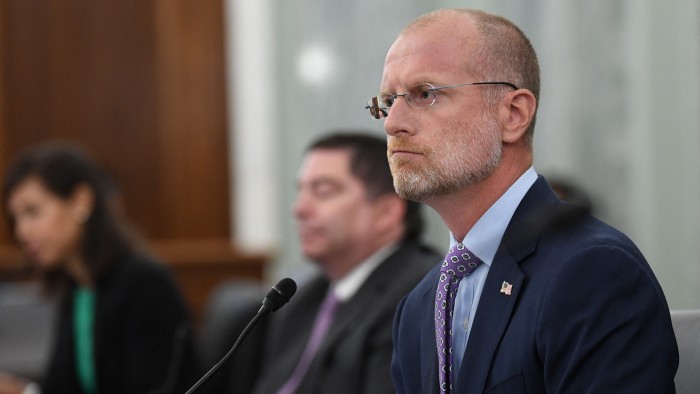Unlock the White House Watch newsletter for free
Your guide to what the 2024 US election means for Washington and the world
Donald Trump has nominated Brendan Carr to head the Federal Communications Commission, handing a vociferous critic of Big Tech the job of regulating television, internet services and radio in the US.
The president-elect announced the nomination late on Sunday, describing Carr, already the most senior Republican commissioner on the FCC, as “a warrior for Free Speech” who would “end the regulatory onslaught that has been crippling America’s Job Creators and Innovators”.
While the FCC does not directly regulate large tech groups, it oversees parts of the sector such as broadband access and net neutrality.
Carr has previously suggested curbing the legal protections for internet publishers enshrined in Section 230 of the Communications Decency Act, which shields online platforms from legal liability over content posted by users. He also authored a chapter in Project 2025, the controversial manifesto from the conservative Heritage Foundation think-tank.
Last week, he accused Meta, Alphabet, Apple and Microsoft of being part of a “censorship cartel” that has “silenced Americans”.
The nomination of Carr could be a boost for billionaire Elon Musk, whose Starlink satellites business has sought permission to orbit closer to Earth to better compete with broadband providers. Carr has also supported allocating hundreds of millions of dollars in state subsidies to help Musk build Starlink’s network.
Trump has pledged to bring the FCC, an independent regulatory agency, “back under Presidential authority, as the Constitution demands”, although media executives question whether he would be able to do this in practice.
Press freedom campaigners have warned that Trump’s incoming administration could lead to a more hostile environment for the media, either overtly by regulation or through White House threats and favours.
During the campaign trail, Trump repeatedly threatened TV news channels such as CBS, NBC and Fox with revoking broadcast licences, and described the US press as “actually the enemy of the people”.
Jessica Rosenworcel, current chair of the FCC, was forced during the election campaign to state that “the Commission does not revoke licenses for broadcast stations simply because a political candidate disagrees with or dislikes content or coverage”. She pointed to the First Amendment of the US Constitution, which protects freedom of speech and freedom of the press.
Carr on Sunday said “broadcast media have had the privilege of using a scarce and valuable public resource — our airwaves. In turn, they are required by law to operate in the public interest. When the transition is complete, the FCC will enforce this public interest obligation.”
Read the full article here

